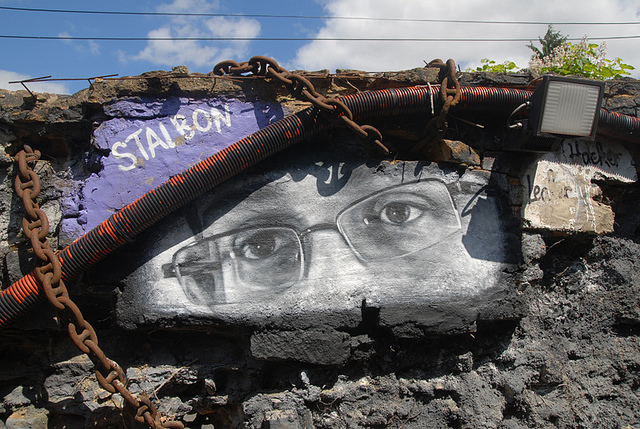Since the Snowden revelations, more people have joined the discussion on digital rights, but change requires more than conversation
In recent years, the Snowden revelations and debates in the UK and US around the scope of government surveillance have brought the issue of privacy in the digital age a greater audience than ever before. Hanane Boujemi argues that society must change its attitude to where boundaries lie if rights are to be meaningfully protected in the online sphere.

Credit: Thierry Ehrmann, CC BY 2.0
The Snowden revelations have resulted in unprecedented global condemnation of the United States’ mass surveillance practices. The same revelations have also mobilised the international community concerned with defending digital rights to call for greater respect for privacy on the Internet. It is essential to instil trust in this medium, because it is a revolutionary and vital communication tool in the modern age that is entrusted with delivering billions of messages on a daily basis, connecting people from all around the world.
During a recent debate on ‘Defending Human Rights in a Digital Age’ organised by the Global Media Program at Goldsmiths University of London in collaboration with Radical Media Events, a multidisciplinary panel of practitioners addressed a number of questions around the extent to which government mass surveillance programs have damaged trust of the users in the Internet and the importance of raising public awareness on the issue.
In discussions about the impact of mass surveillance on human rights, the focus is often on two rights, privacy and freedom of expression, which are enshrined in the International Covenant on Civil and Political Rights and the Universal Declaration of Human Rights. It is also important, however, to examine how other rights may be implicated in these practices, namely the rights of women, the rights of persons with disabilities, the right to cultural diversity, and the right to education.
Not all Internet users have the same concerns when it comes to human rights online. Context and culture may play a role in user expectations. A case in point is how privacy as a right is perceived in the Middle East; the end users in that region are more concerned about disclosing their personal financial data than their personal communications data. They are indifferent to the fact that government is spying on their communications, because this is perceived as common practice. Freedom of expression and association remain, however, a top a priority following the 2011 turmoil, which swept the whole region. On the other hand, Snowden revelations did not trigger the same level of concern from the Arab governments’ side. In fact, not one single official authority from the region condemned NSA mass surveillance operations.
The digital rights battle in the Middle East is at its early stages. The uprising gave people confidence to speak up and to express their views about critical issues relevant to them, but it also triggered hard line policies from governments. Public authorities have increasingly clamped down on freedom of expression on the Internet, as it is the perfect platform to amplify people’s voices about how their countries are run.
Raising awareness on digital rights in the Middle East to a wider audience is also hard to sell. There are a number of initiatives that were launched to specifically reach out to Internet users in the region and explain in simple terms the importance of these concepts. The work ought to be initiated at the grassroots level in order to instill digital rights values in the users so these values are part of their culture.
The responsibility of corporations in preserving rights is also relevant to the current discussion. There are limitations specific to the language. Legal terminology used in their terms of service is not accessible to Internet users; the legal jargon is complex and difficult for the average Internet user to understand. Further, the language does not usually focus on the users’ rights but on the users’ obligations. Users tend to accept the terms and conditions regardless of what they entail. Therefore, they may be agreeing to practices that compromise their privacy without even realizing it.
Dense legal jargon is not the only challenge for end users and digital rights advocates. A lack of technical knowledge can also make it difficult to engage effectively with various institutions responsible for maintaining Internet infrastructure. Leading the digital rights battle requires a good understanding of how the Internet functions. Few advocates have this skill set. Too often, government officials making decisions about the Internet also lack the necessary technical knowledge. There is a missing link between technology, policy implementation, and public interest, which hinders productive discussion.
Following the Snowden revelations, more people have joined the discussion on digital rights, but change will require more than conversation. The current body of work is limited to analysing the landscape, including the extent to which specific practices, by either the government or companies, comply with guaranteed human rights. Indeed, existing international standards, regional agreements, and local policies are key instruments to preserve human rights on the Internet, yet there is very little evidence that these same instruments can be used practically to claim those rights. Advocates must challenge the current business models of content providers, which entirely depend on data voluntarily shared by users. It is also vital for Internet-related policy processes be transparent, participatory, progressive, and compatible with technology.
—
Note: This post represents the views of the author, and not those of Democratic Audit or the LSE. Please read our comments policy before posting.
—
 Hanane Boujemi is Senior Manager, Internet Governance Program MENA Region- Hivos
Hanane Boujemi is Senior Manager, Internet Governance Program MENA Region- Hivos





 Democratic Audit's core funding is provided by the Joseph Rowntree Charitable Trust. Additional funding is provided by the London School of Economics.
Democratic Audit's core funding is provided by the Joseph Rowntree Charitable Trust. Additional funding is provided by the London School of Economics.
Interesting piece by @HananeBoujemi -> Since Snowden, more people discuss digital rights, but change requires more https://t.co/OhOT6OXL8q
Digital rights: debate vs action by @HananeBoujemi – points that different users need/want different digital rights https://t.co/LPS0fMF6Kk
Digital rights: debate vs action by @HananeBoujemi https://t.co/CI0JQEIxME @RMF_Goldsmiths @netrights @CasparBowden @sherifea @hivosorg
Human rights in Post-Snowden: changes required in the conversation about digital rights https://t.co/9DBSxOMTIT via @democraticaudit
Since Snowden revelations, more people have joined discussion digital rights https://t.co/YWXVnYWwLy
Post-snowden, more people have joined the discussion on digital rights, but change requires more than conversation https://t.co/sRYw8sPV1L
Since the Snowden revelations, more people have joined the discussion on digital rights, but change will requires … https://t.co/TyswatWgNj
Post-Snowden, more people have joined the discussion on digital rights, but change requires more than conversation https://t.co/WhiXt2LL6t
Since the Snowden revelations, more people have joined the discussion on digital rights, but change will requires… https://t.co/LX8oF3DMtJ